Marbleheaders today will tell you it’s too bad Elbridge Gerry is best remembered for the creation of oddly shaped and highly partisan electoral districts, known as gerrymandering.
When he served as governor of Massachusetts in 1812, the General Court sent him a plan to redraw political districts. Gerry thought the plan unfairly favored incumbent politicians. But he signed it anyway, probably the biggest mistake of his life. That single act would seal his reputation for political chicanery.
Elbridge Gerry didn’t deserve to have his name forever linked with political trickery. During his lifetime he had a reputation for integrity. He stood on principle even if it cost him. His shrewd business sense and logistical acumen were indispensable to the Revolutionary cause. He knew how to keep New Englanders and the military supplied – an oft-overlooked key to American victory.
John Adams admired him, saying,
If every Man here was a Gerry, the Liberties of America would be safe against the Gates of Earth and Hell.
The Roads of Revolution
Elbridge Gerry was born in Marblehead, Mass., on July 17, 1744 (Old Style), the son of a wealthy merchant.
By the tme he was 20, Elbridge Gerry earned graduate and undergraduate degrees from Harvard. His master’s thesis in 1765 argued the colonies should resist the recently passed Stamp Act.
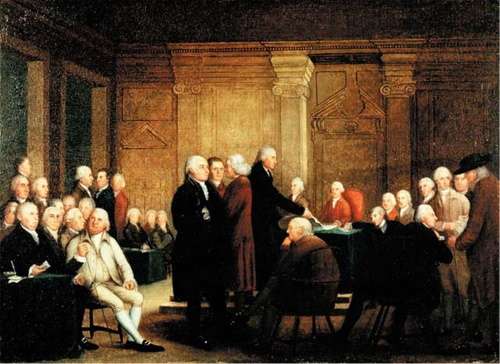
A depiction of the Second Continental Congress voting on the United States Declaration of Independence
After Harvard, he went to work for his father’s counting house. The Gerry family owned ships and traded dried codfish with Barbados and Spanish ports. He prospered, and by the time he took his pen to the Declaration of Independence he was ranked the 11th wealthiest of the 56 signers.
In 1770, Elbridge Gerry sat on a Marblehead committee to enforce the prohibition on tea. He later joined his father on Marblehead’s Committee of Correspondence. The committees, which served as shadow governments, were crucial to successful colonial resistance to Britain.
He was elected to the Massachusetts General Court in 1772. There he made friends with Sam Adams. When the British Parliament closed the port of Boston in June 1774, Gerry managed to get provisions and arms to New England. Marblehead became a key port of entry, and Gerry made sure the goods they delivered made it safely to Boston. The Revolutionary propagandist Mercy Otis Warren said he did it with “punctuality and indefatigable industry.”
Supply Chain Issues
As a member of the Committee of Safety of the Massachusetts Provincial Congress, he played a key role in moving arms and ammunition to Concord and away from the British Army. On the night of Paul Revere’s famous ride, he was staying at the Menotomy (now Arlington) Tavern with two patriot colonels. The tavern was on the road the British took to Lexington. Some redcoats stopped to search it, and Gerry and his companions escaped capture by hiding in a cornfield, still in their nightclothes.
He then spent the early days of the Revolution in Boston raising troops and supplies for the Continental Army, using his business contacts in Europe.. It was Gerry who came up with the plan to encourage privateering. He might have been hanged for it.
John Adams was a big fan of privateering as a revolutionary weapon.
Adams wrote privateering,
…pays its own expenses and procures its own men … and is the surest way of distressing their commerce, [and] protecting our own.
Ups and Downs, Ins and Outs
Elbridge Gerry was a small dapper businessman, aristocratic and charming but without a sense of humor. He didn’t marry until he was in his 40s. When he did marry Ann Thompson, 20 years his junior, he made up for lost time. They had 10 children.
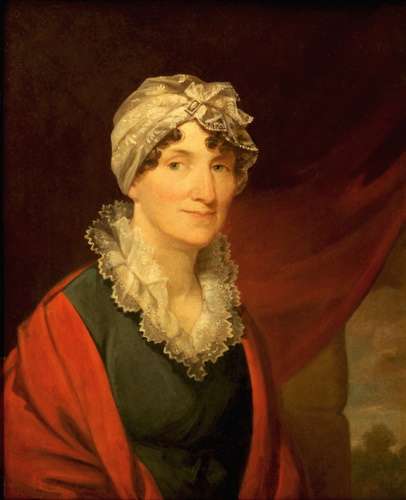
Ann Thompson by John Vanderlyn
He was a man of principle, though those principles could change.
After the Revolution, he spent the rest of his life in and out of political office. He bought Elmwood, the Cambridge estate of the former lieutenant governor, Thomas Oliver, which the state had confiscated. Later James Russell Lowell was born in the house.
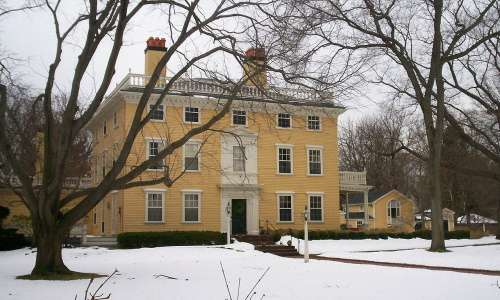
Elmwood, now on the National Register of Historic Places.
He played a large role in the Constitutional Convention. At first he supported a strong central government. Then he refused to sign the Constitution because it didn’t guarantee individual liberties. Later he supported ratification.
He was a member of the U.S. House of Representatives from 1789 to 1793, a diplomat to France from 1797-98 and governor of Massachusetts from 1810-12.
Gerry lost much of his money when elected governor because his brother defaulted on a large loan that Gerry had guaranteed. Needing a job, Elbridge Gerry asked President James Madison to choose him as vice president. Two weeks after he lost re-election as governor, Madison did him a solid and invited him to run as his vice president. Madison had a motive, though. He wanted to appease the Northeast after he started the hugely unpopular War of 1812.
Madison won reelection, and Gerry then became popular in Washington, D.C., and a favorite of Dolley Madison. He died in office on Nov. 23, 1814.
Gerry Plus Salamander
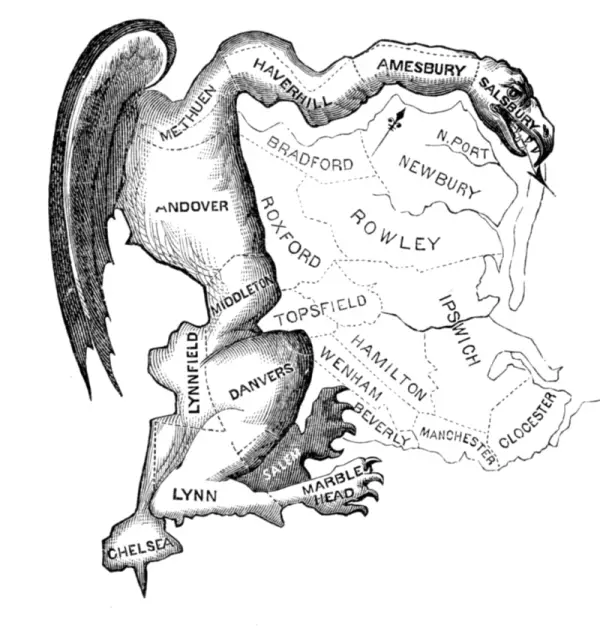
Gerry had won election Massachusetts governor as a Democrat-Republican.
The Legislature was then controlled by the Democrat-Republicans as well. Under the state constitution, it had to redraw electoral districts. The lawmakers sent Gerry a plan that drew some districts in crazy shapes to make it easier for the Democrat-Republicans to win re-election. Gerry thought the plan unfair. He told his son-in-law he found the bill ‘highly disagreeable,’ but he signed it anyway on Feb. 11, 1812.

Detail from Gilbert Stuart self portrait, Redwood Library and Athenaeum in Newport, R.I.
One district in Essex County was shaped like a salamander. The editor of an opposition newspaper hung the map over his desk. The story goes that the artist Gilbert Stuart came into the editor’s office one day and saw the map. Stuart then grabbed his pencil and drew a head, claws and wings onto the map and said, “That will do for a salamander.” The editor retorted, “Better say a gerrymander.”
The newspaper printed Stuart’s cartoon along with the word gerrymander and spread it far and wide. Elbridge Gerry’s reputation was sealed for the ages.
Historian Sarah J. Purcell offers another take on him. Elbridge Gerry, she wrote,
…was consistently motivated by a desire to do what he thought was right to create the most moral, virtuous, and stable American nation possible.
With thanks to the Society of the Descendants of the Declaration of Independence. Image of Elmwood By Midnightdreary – Own work, CC BY-SA 3.0, https://commons.wikimedia.org/w/index.php?curid=5578063.
This story last updated in 2022.
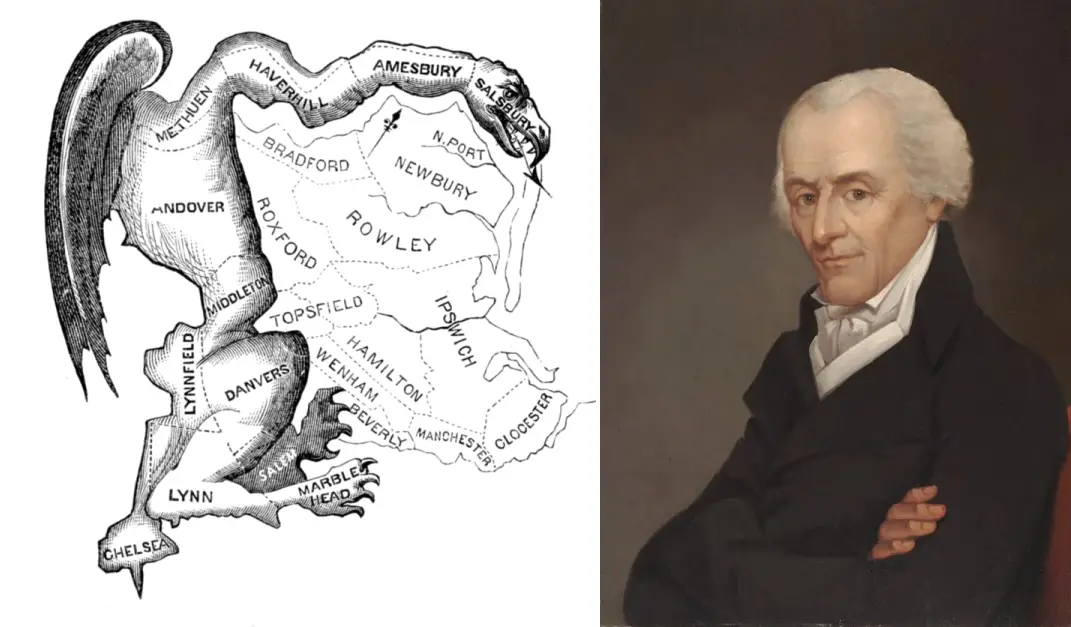
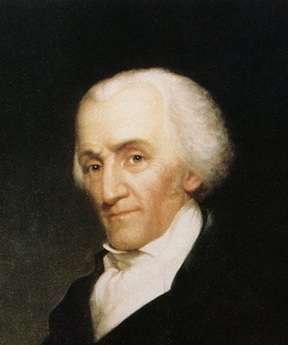
5 comments
Interesting. I never knew where the word “gerrymander” came from.
Not sure if one can visit it, but his home is in Marblehead, MA…
Thank you for posting this story that I recommended.
Fascinating !!
[…] on October 30, 1808 it came as a shock to Marblehead, Mass., a town with a long seafaring tradition, when the schooner Betsy returned to port from a […]
Comments are closed.